Analysis of Organizational Behaviour and Performance at Sainsbury's
VerifiedAdded on 2023/01/18
|16
|4974
|40
Report
AI Summary
This report provides a comprehensive analysis of organizational behaviour within Sainsbury's, examining the impact of culture, politics, and power on individual and team performance. It delves into various organizational cultures and their effects on employee behaviour, emphasizing the need for a positive work environment. The report assesses content and process theories of motivation, including McGregor's Theory X and Y, Herzberg's Motivation-Hygiene theory, and Vroom's Expectancy Theory, illustrating their application in enhancing employee motivation and goal achievement. Furthermore, it differentiates between effective and ineffective teams, highlighting the role of organizational culture and politics in fostering team success. The report concludes with an application of organizational behaviour concepts and philosophies within the context of Sainsbury's business situation, providing a holistic understanding of the factors influencing organizational dynamics and performance.
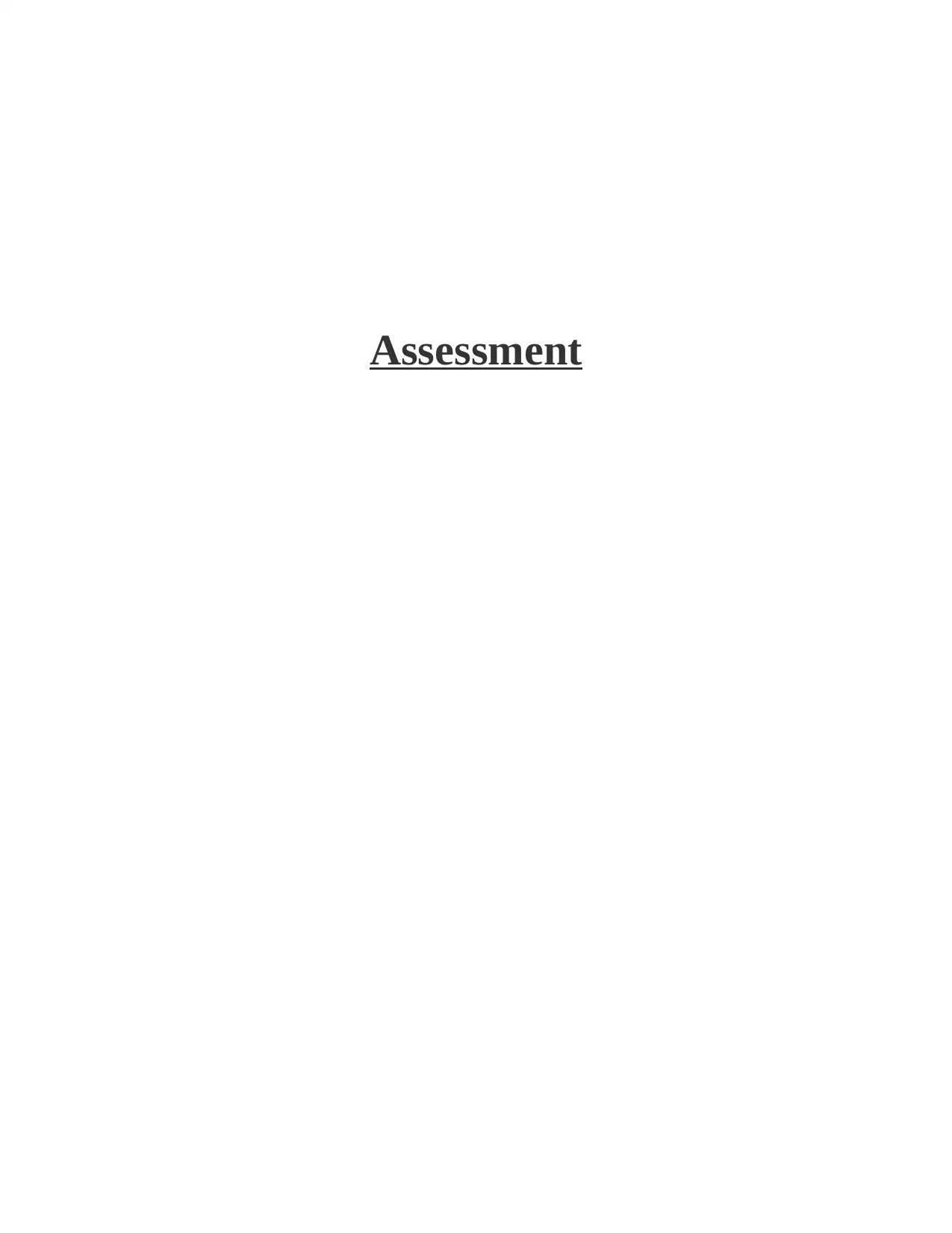
Assessment
Paraphrase This Document
Need a fresh take? Get an instant paraphrase of this document with our AI Paraphraser
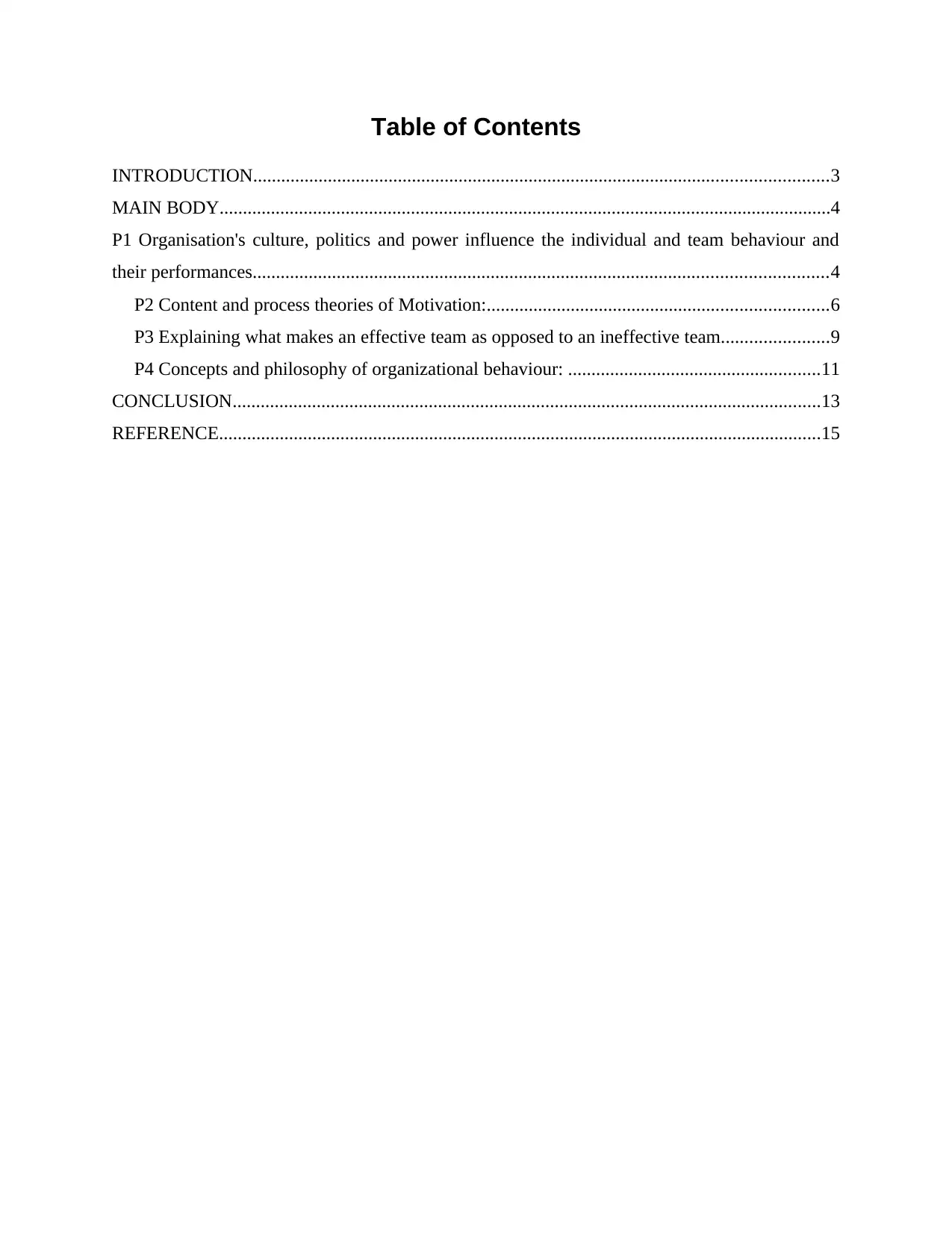
Table of Contents
INTRODUCTION...........................................................................................................................3
MAIN BODY...................................................................................................................................4
P1 Organisation's culture, politics and power influence the individual and team behaviour and
their performances...........................................................................................................................4
P2 Content and process theories of Motivation:.........................................................................6
P3 Explaining what makes an effective team as opposed to an ineffective team.......................9
P4 Concepts and philosophy of organizational behaviour: ......................................................11
CONCLUSION..............................................................................................................................13
REFERENCE.................................................................................................................................15
INTRODUCTION...........................................................................................................................3
MAIN BODY...................................................................................................................................4
P1 Organisation's culture, politics and power influence the individual and team behaviour and
their performances...........................................................................................................................4
P2 Content and process theories of Motivation:.........................................................................6
P3 Explaining what makes an effective team as opposed to an ineffective team.......................9
P4 Concepts and philosophy of organizational behaviour: ......................................................11
CONCLUSION..............................................................................................................................13
REFERENCE.................................................................................................................................15
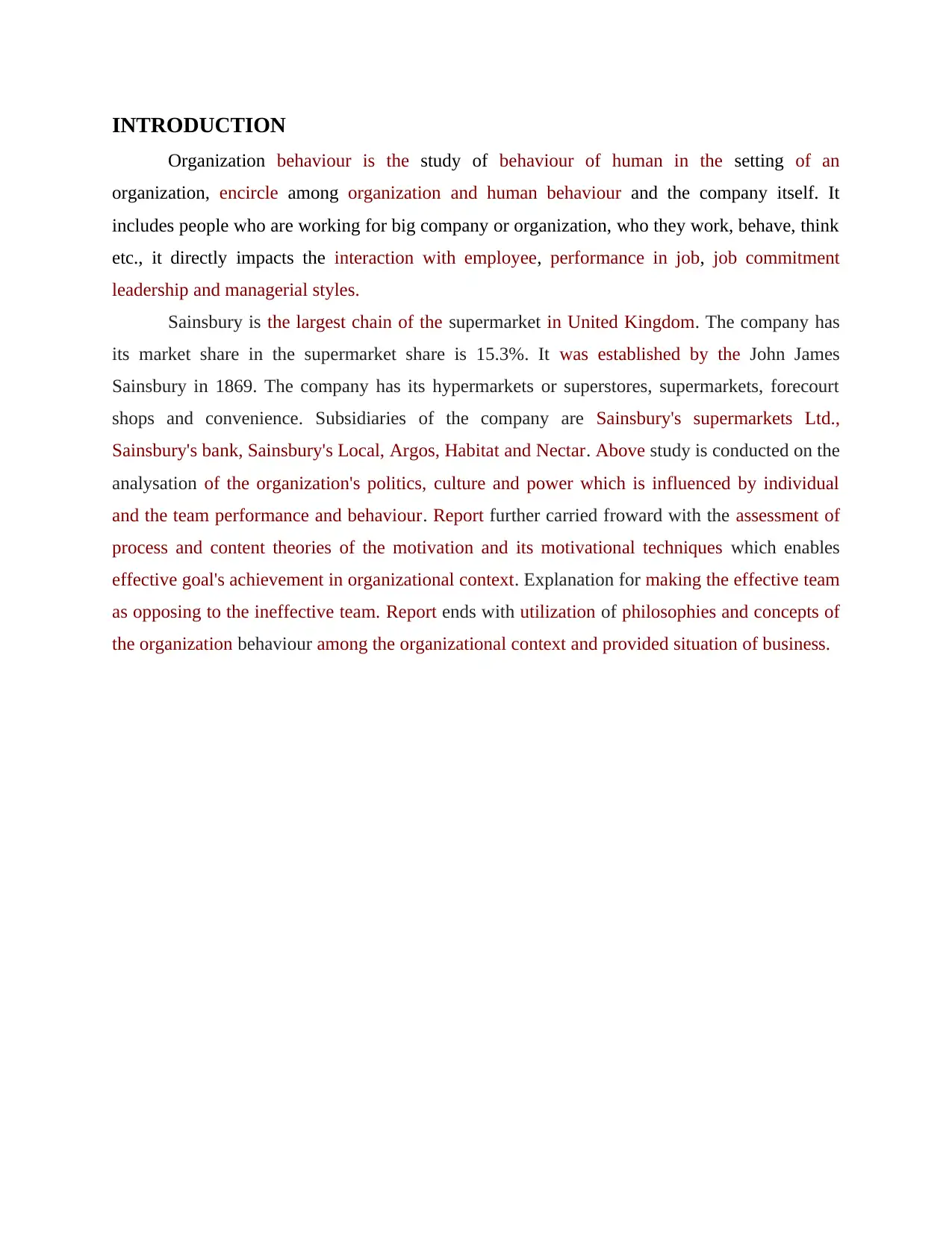
INTRODUCTION
Organization behaviour is the study of behaviour of human in the setting of an
organization, encircle among organization and human behaviour and the company itself. It
includes people who are working for big company or organization, who they work, behave, think
etc., it directly impacts the interaction with employee, performance in job, job commitment
leadership and managerial styles.
Sainsbury is the largest chain of the supermarket in United Kingdom. The company has
its market share in the supermarket share is 15.3%. It was established by the John James
Sainsbury in 1869. The company has its hypermarkets or superstores, supermarkets, forecourt
shops and convenience. Subsidiaries of the company are Sainsbury's supermarkets Ltd.,
Sainsbury's bank, Sainsbury's Local, Argos, Habitat and Nectar. Above study is conducted on the
analysation of the organization's politics, culture and power which is influenced by individual
and the team performance and behaviour. Report further carried froward with the assessment of
process and content theories of the motivation and its motivational techniques which enables
effective goal's achievement in organizational context. Explanation for making the effective team
as opposing to the ineffective team. Report ends with utilization of philosophies and concepts of
the organization behaviour among the organizational context and provided situation of business.
Organization behaviour is the study of behaviour of human in the setting of an
organization, encircle among organization and human behaviour and the company itself. It
includes people who are working for big company or organization, who they work, behave, think
etc., it directly impacts the interaction with employee, performance in job, job commitment
leadership and managerial styles.
Sainsbury is the largest chain of the supermarket in United Kingdom. The company has
its market share in the supermarket share is 15.3%. It was established by the John James
Sainsbury in 1869. The company has its hypermarkets or superstores, supermarkets, forecourt
shops and convenience. Subsidiaries of the company are Sainsbury's supermarkets Ltd.,
Sainsbury's bank, Sainsbury's Local, Argos, Habitat and Nectar. Above study is conducted on the
analysation of the organization's politics, culture and power which is influenced by individual
and the team performance and behaviour. Report further carried froward with the assessment of
process and content theories of the motivation and its motivational techniques which enables
effective goal's achievement in organizational context. Explanation for making the effective team
as opposing to the ineffective team. Report ends with utilization of philosophies and concepts of
the organization behaviour among the organizational context and provided situation of business.
⊘ This is a preview!⊘
Do you want full access?
Subscribe today to unlock all pages.

Trusted by 1+ million students worldwide
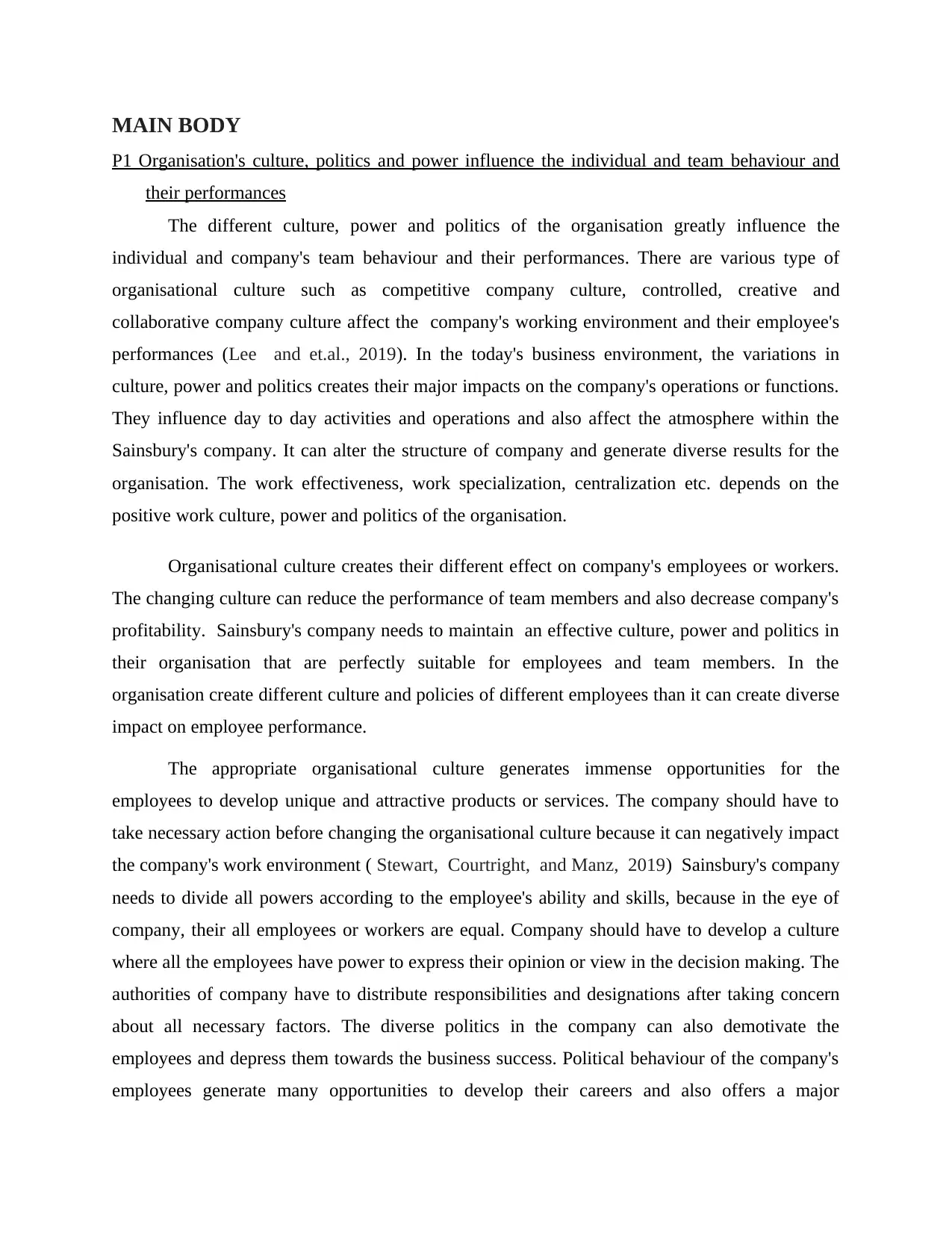
MAIN BODY
P1 Organisation's culture, politics and power influence the individual and team behaviour and
their performances
The different culture, power and politics of the organisation greatly influence the
individual and company's team behaviour and their performances. There are various type of
organisational culture such as competitive company culture, controlled, creative and
collaborative company culture affect the company's working environment and their employee's
performances (Lee and et.al., 2019). In the today's business environment, the variations in
culture, power and politics creates their major impacts on the company's operations or functions.
They influence day to day activities and operations and also affect the atmosphere within the
Sainsbury's company. It can alter the structure of company and generate diverse results for the
organisation. The work effectiveness, work specialization, centralization etc. depends on the
positive work culture, power and politics of the organisation.
Organisational culture creates their different effect on company's employees or workers.
The changing culture can reduce the performance of team members and also decrease company's
profitability. Sainsbury's company needs to maintain an effective culture, power and politics in
their organisation that are perfectly suitable for employees and team members. In the
organisation create different culture and policies of different employees than it can create diverse
impact on employee performance.
The appropriate organisational culture generates immense opportunities for the
employees to develop unique and attractive products or services. The company should have to
take necessary action before changing the organisational culture because it can negatively impact
the company's work environment ( Stewart, Courtright, and Manz, 2019) Sainsbury's company
needs to divide all powers according to the employee's ability and skills, because in the eye of
company, their all employees or workers are equal. Company should have to develop a culture
where all the employees have power to express their opinion or view in the decision making. The
authorities of company have to distribute responsibilities and designations after taking concern
about all necessary factors. The diverse politics in the company can also demotivate the
employees and depress them towards the business success. Political behaviour of the company's
employees generate many opportunities to develop their careers and also offers a major
P1 Organisation's culture, politics and power influence the individual and team behaviour and
their performances
The different culture, power and politics of the organisation greatly influence the
individual and company's team behaviour and their performances. There are various type of
organisational culture such as competitive company culture, controlled, creative and
collaborative company culture affect the company's working environment and their employee's
performances (Lee and et.al., 2019). In the today's business environment, the variations in
culture, power and politics creates their major impacts on the company's operations or functions.
They influence day to day activities and operations and also affect the atmosphere within the
Sainsbury's company. It can alter the structure of company and generate diverse results for the
organisation. The work effectiveness, work specialization, centralization etc. depends on the
positive work culture, power and politics of the organisation.
Organisational culture creates their different effect on company's employees or workers.
The changing culture can reduce the performance of team members and also decrease company's
profitability. Sainsbury's company needs to maintain an effective culture, power and politics in
their organisation that are perfectly suitable for employees and team members. In the
organisation create different culture and policies of different employees than it can create diverse
impact on employee performance.
The appropriate organisational culture generates immense opportunities for the
employees to develop unique and attractive products or services. The company should have to
take necessary action before changing the organisational culture because it can negatively impact
the company's work environment ( Stewart, Courtright, and Manz, 2019) Sainsbury's company
needs to divide all powers according to the employee's ability and skills, because in the eye of
company, their all employees or workers are equal. Company should have to develop a culture
where all the employees have power to express their opinion or view in the decision making. The
authorities of company have to distribute responsibilities and designations after taking concern
about all necessary factors. The diverse politics in the company can also demotivate the
employees and depress them towards the business success. Political behaviour of the company's
employees generate many opportunities to develop their careers and also offers a major
Paraphrase This Document
Need a fresh take? Get an instant paraphrase of this document with our AI Paraphraser
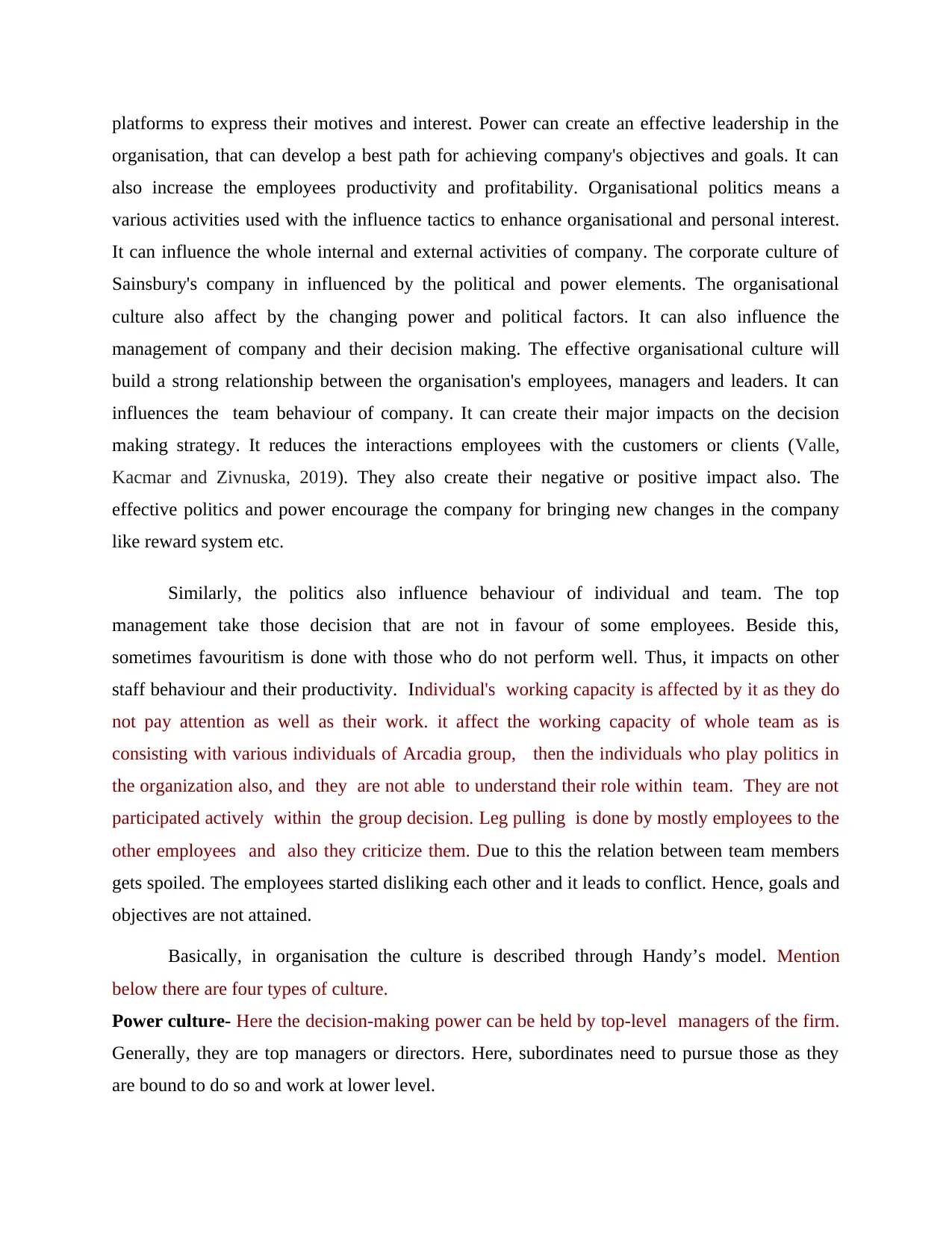
platforms to express their motives and interest. Power can create an effective leadership in the
organisation, that can develop a best path for achieving company's objectives and goals. It can
also increase the employees productivity and profitability. Organisational politics means a
various activities used with the influence tactics to enhance organisational and personal interest.
It can influence the whole internal and external activities of company. The corporate culture of
Sainsbury's company in influenced by the political and power elements. The organisational
culture also affect by the changing power and political factors. It can also influence the
management of company and their decision making. The effective organisational culture will
build a strong relationship between the organisation's employees, managers and leaders. It can
influences the team behaviour of company. It can create their major impacts on the decision
making strategy. It reduces the interactions employees with the customers or clients (Valle,
Kacmar and Zivnuska, 2019). They also create their negative or positive impact also. The
effective politics and power encourage the company for bringing new changes in the company
like reward system etc.
Similarly, the politics also influence behaviour of individual and team. The top
management take those decision that are not in favour of some employees. Beside this,
sometimes favouritism is done with those who do not perform well. Thus, it impacts on other
staff behaviour and their productivity. Individual's working capacity is affected by it as they do
not pay attention as well as their work. it affect the working capacity of whole team as is
consisting with various individuals of Arcadia group, then the individuals who play politics in
the organization also, and they are not able to understand their role within team. They are not
participated actively within the group decision. Leg pulling is done by mostly employees to the
other employees and also they criticize them. Due to this the relation between team members
gets spoiled. The employees started disliking each other and it leads to conflict. Hence, goals and
objectives are not attained.
Basically, in organisation the culture is described through Handy’s model. Mention
below there are four types of culture.
Power culture- Here the decision-making power can be held by top-level managers of the firm.
Generally, they are top managers or directors. Here, subordinates need to pursue those as they
are bound to do so and work at lower level.
organisation, that can develop a best path for achieving company's objectives and goals. It can
also increase the employees productivity and profitability. Organisational politics means a
various activities used with the influence tactics to enhance organisational and personal interest.
It can influence the whole internal and external activities of company. The corporate culture of
Sainsbury's company in influenced by the political and power elements. The organisational
culture also affect by the changing power and political factors. It can also influence the
management of company and their decision making. The effective organisational culture will
build a strong relationship between the organisation's employees, managers and leaders. It can
influences the team behaviour of company. It can create their major impacts on the decision
making strategy. It reduces the interactions employees with the customers or clients (Valle,
Kacmar and Zivnuska, 2019). They also create their negative or positive impact also. The
effective politics and power encourage the company for bringing new changes in the company
like reward system etc.
Similarly, the politics also influence behaviour of individual and team. The top
management take those decision that are not in favour of some employees. Beside this,
sometimes favouritism is done with those who do not perform well. Thus, it impacts on other
staff behaviour and their productivity. Individual's working capacity is affected by it as they do
not pay attention as well as their work. it affect the working capacity of whole team as is
consisting with various individuals of Arcadia group, then the individuals who play politics in
the organization also, and they are not able to understand their role within team. They are not
participated actively within the group decision. Leg pulling is done by mostly employees to the
other employees and also they criticize them. Due to this the relation between team members
gets spoiled. The employees started disliking each other and it leads to conflict. Hence, goals and
objectives are not attained.
Basically, in organisation the culture is described through Handy’s model. Mention
below there are four types of culture.
Power culture- Here the decision-making power can be held by top-level managers of the firm.
Generally, they are top managers or directors. Here, subordinates need to pursue those as they
are bound to do so and work at lower level.
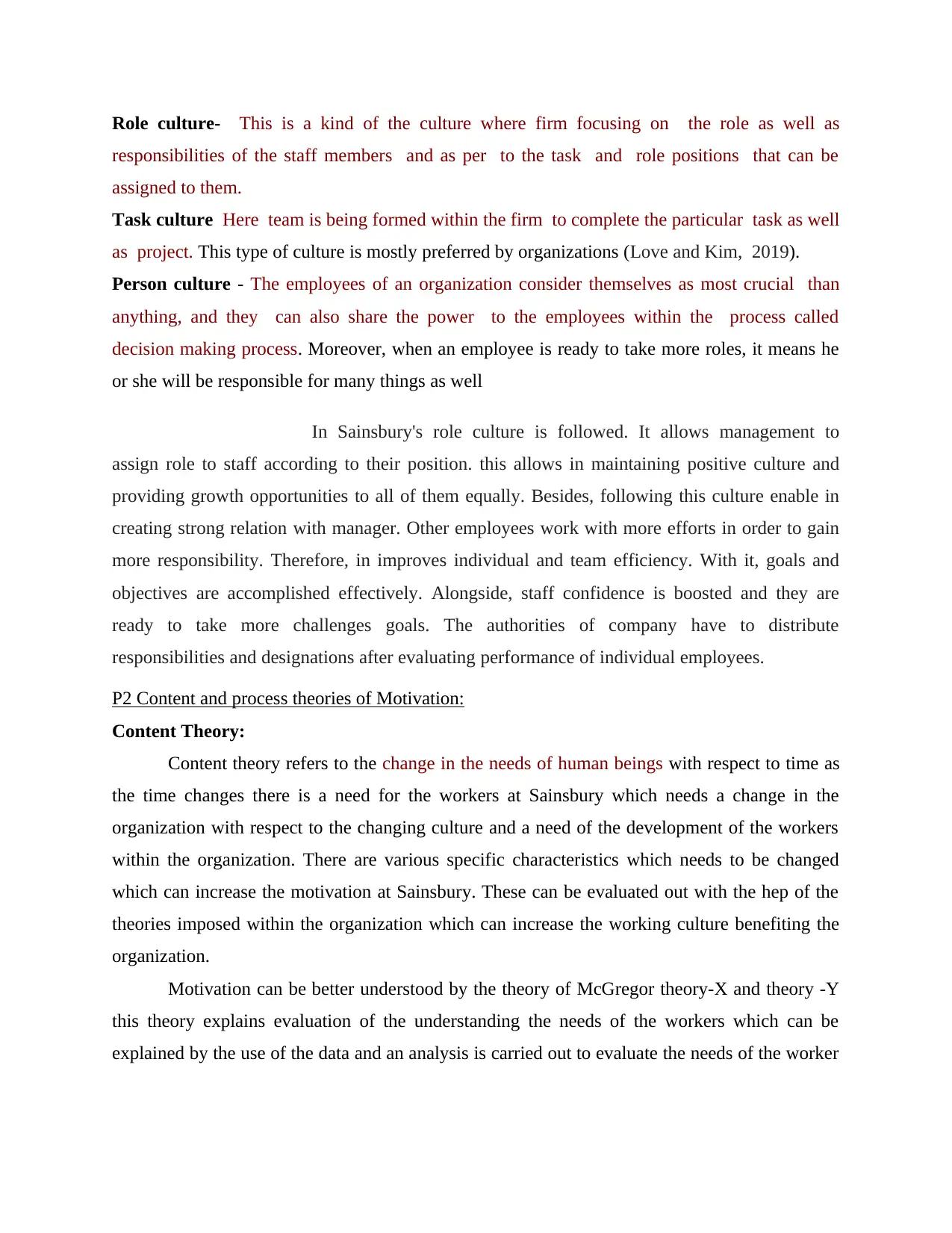
Role culture- This is a kind of the culture where firm focusing on the role as well as
responsibilities of the staff members and as per to the task and role positions that can be
assigned to them.
Task culture Here team is being formed within the firm to complete the particular task as well
as project. This type of culture is mostly preferred by organizations (Love and Kim, 2019).
Person culture - The employees of an organization consider themselves as most crucial than
anything, and they can also share the power to the employees within the process called
decision making process. Moreover, when an employee is ready to take more roles, it means he
or she will be responsible for many things as well
In Sainsbury's role culture is followed. It allows management to
assign role to staff according to their position. this allows in maintaining positive culture and
providing growth opportunities to all of them equally. Besides, following this culture enable in
creating strong relation with manager. Other employees work with more efforts in order to gain
more responsibility. Therefore, in improves individual and team efficiency. With it, goals and
objectives are accomplished effectively. Alongside, staff confidence is boosted and they are
ready to take more challenges goals. The authorities of company have to distribute
responsibilities and designations after evaluating performance of individual employees.
P2 Content and process theories of Motivation:
Content Theory:
Content theory refers to the change in the needs of human beings with respect to time as
the time changes there is a need for the workers at Sainsbury which needs a change in the
organization with respect to the changing culture and a need of the development of the workers
within the organization. There are various specific characteristics which needs to be changed
which can increase the motivation at Sainsbury. These can be evaluated out with the hep of the
theories imposed within the organization which can increase the working culture benefiting the
organization.
Motivation can be better understood by the theory of McGregor theory-X and theory -Y
this theory explains evaluation of the understanding the needs of the workers which can be
explained by the use of the data and an analysis is carried out to evaluate the needs of the worker
responsibilities of the staff members and as per to the task and role positions that can be
assigned to them.
Task culture Here team is being formed within the firm to complete the particular task as well
as project. This type of culture is mostly preferred by organizations (Love and Kim, 2019).
Person culture - The employees of an organization consider themselves as most crucial than
anything, and they can also share the power to the employees within the process called
decision making process. Moreover, when an employee is ready to take more roles, it means he
or she will be responsible for many things as well
In Sainsbury's role culture is followed. It allows management to
assign role to staff according to their position. this allows in maintaining positive culture and
providing growth opportunities to all of them equally. Besides, following this culture enable in
creating strong relation with manager. Other employees work with more efforts in order to gain
more responsibility. Therefore, in improves individual and team efficiency. With it, goals and
objectives are accomplished effectively. Alongside, staff confidence is boosted and they are
ready to take more challenges goals. The authorities of company have to distribute
responsibilities and designations after evaluating performance of individual employees.
P2 Content and process theories of Motivation:
Content Theory:
Content theory refers to the change in the needs of human beings with respect to time as
the time changes there is a need for the workers at Sainsbury which needs a change in the
organization with respect to the changing culture and a need of the development of the workers
within the organization. There are various specific characteristics which needs to be changed
which can increase the motivation at Sainsbury. These can be evaluated out with the hep of the
theories imposed within the organization which can increase the working culture benefiting the
organization.
Motivation can be better understood by the theory of McGregor theory-X and theory -Y
this theory explains evaluation of the understanding the needs of the workers which can be
explained by the use of the data and an analysis is carried out to evaluate the needs of the worker
⊘ This is a preview!⊘
Do you want full access?
Subscribe today to unlock all pages.

Trusted by 1+ million students worldwide
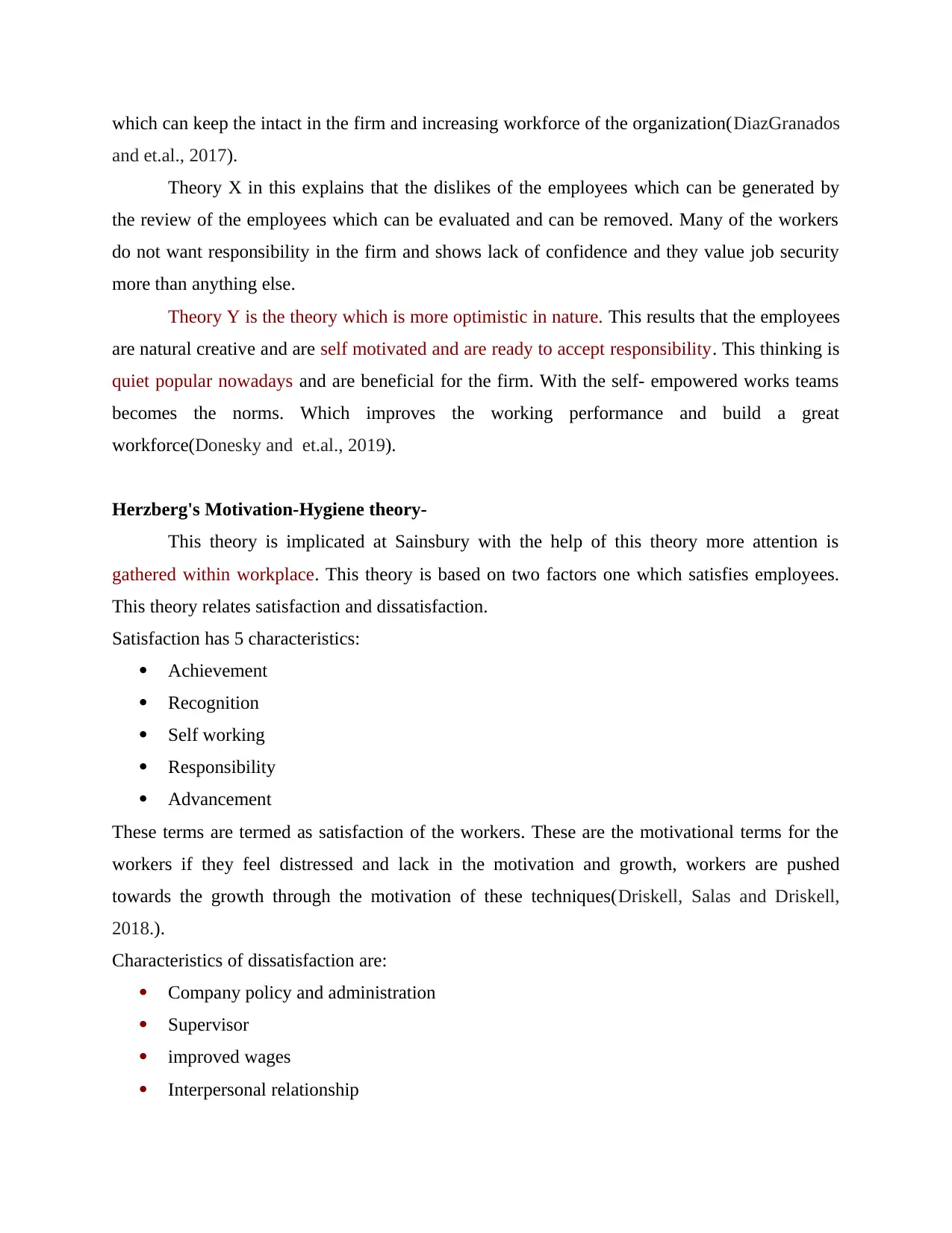
which can keep the intact in the firm and increasing workforce of the organization(DiazGranados
and et.al., 2017).
Theory X in this explains that the dislikes of the employees which can be generated by
the review of the employees which can be evaluated and can be removed. Many of the workers
do not want responsibility in the firm and shows lack of confidence and they value job security
more than anything else.
Theory Y is the theory which is more optimistic in nature. This results that the employees
are natural creative and are self motivated and are ready to accept responsibility. This thinking is
quiet popular nowadays and are beneficial for the firm. With the self- empowered works teams
becomes the norms. Which improves the working performance and build a great
workforce(Donesky and et.al., 2019).
Herzberg's Motivation-Hygiene theory-
This theory is implicated at Sainsbury with the help of this theory more attention is
gathered within workplace. This theory is based on two factors one which satisfies employees.
This theory relates satisfaction and dissatisfaction.
Satisfaction has 5 characteristics:
Achievement
Recognition
Self working
Responsibility
Advancement
These terms are termed as satisfaction of the workers. These are the motivational terms for the
workers if they feel distressed and lack in the motivation and growth, workers are pushed
towards the growth through the motivation of these techniques(Driskell, Salas and Driskell,
2018.).
Characteristics of dissatisfaction are:
Company policy and administration
Supervisor
improved wages
Interpersonal relationship
and et.al., 2017).
Theory X in this explains that the dislikes of the employees which can be generated by
the review of the employees which can be evaluated and can be removed. Many of the workers
do not want responsibility in the firm and shows lack of confidence and they value job security
more than anything else.
Theory Y is the theory which is more optimistic in nature. This results that the employees
are natural creative and are self motivated and are ready to accept responsibility. This thinking is
quiet popular nowadays and are beneficial for the firm. With the self- empowered works teams
becomes the norms. Which improves the working performance and build a great
workforce(Donesky and et.al., 2019).
Herzberg's Motivation-Hygiene theory-
This theory is implicated at Sainsbury with the help of this theory more attention is
gathered within workplace. This theory is based on two factors one which satisfies employees.
This theory relates satisfaction and dissatisfaction.
Satisfaction has 5 characteristics:
Achievement
Recognition
Self working
Responsibility
Advancement
These terms are termed as satisfaction of the workers. These are the motivational terms for the
workers if they feel distressed and lack in the motivation and growth, workers are pushed
towards the growth through the motivation of these techniques(Driskell, Salas and Driskell,
2018.).
Characteristics of dissatisfaction are:
Company policy and administration
Supervisor
improved wages
Interpersonal relationship
Paraphrase This Document
Need a fresh take? Get an instant paraphrase of this document with our AI Paraphraser
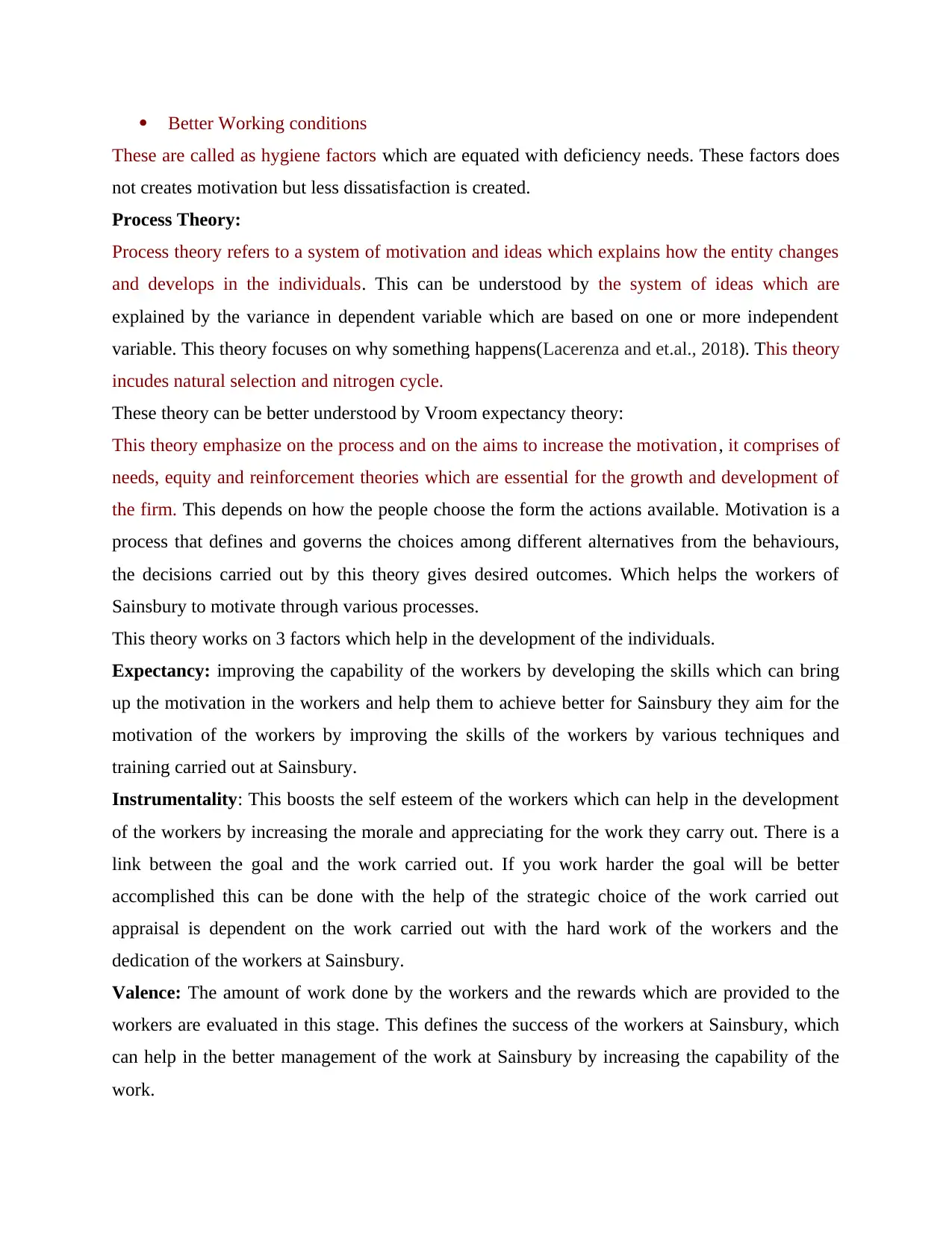
Better Working conditions
These are called as hygiene factors which are equated with deficiency needs. These factors does
not creates motivation but less dissatisfaction is created.
Process Theory:
Process theory refers to a system of motivation and ideas which explains how the entity changes
and develops in the individuals. This can be understood by the system of ideas which are
explained by the variance in dependent variable which are based on one or more independent
variable. This theory focuses on why something happens(Lacerenza and et.al., 2018). This theory
incudes natural selection and nitrogen cycle.
These theory can be better understood by Vroom expectancy theory:
This theory emphasize on the process and on the aims to increase the motivation, it comprises of
needs, equity and reinforcement theories which are essential for the growth and development of
the firm. This depends on how the people choose the form the actions available. Motivation is a
process that defines and governs the choices among different alternatives from the behaviours,
the decisions carried out by this theory gives desired outcomes. Which helps the workers of
Sainsbury to motivate through various processes.
This theory works on 3 factors which help in the development of the individuals.
Expectancy: improving the capability of the workers by developing the skills which can bring
up the motivation in the workers and help them to achieve better for Sainsbury they aim for the
motivation of the workers by improving the skills of the workers by various techniques and
training carried out at Sainsbury.
Instrumentality: This boosts the self esteem of the workers which can help in the development
of the workers by increasing the morale and appreciating for the work they carry out. There is a
link between the goal and the work carried out. If you work harder the goal will be better
accomplished this can be done with the help of the strategic choice of the work carried out
appraisal is dependent on the work carried out with the hard work of the workers and the
dedication of the workers at Sainsbury.
Valence: The amount of work done by the workers and the rewards which are provided to the
workers are evaluated in this stage. This defines the success of the workers at Sainsbury, which
can help in the better management of the work at Sainsbury by increasing the capability of the
work.
These are called as hygiene factors which are equated with deficiency needs. These factors does
not creates motivation but less dissatisfaction is created.
Process Theory:
Process theory refers to a system of motivation and ideas which explains how the entity changes
and develops in the individuals. This can be understood by the system of ideas which are
explained by the variance in dependent variable which are based on one or more independent
variable. This theory focuses on why something happens(Lacerenza and et.al., 2018). This theory
incudes natural selection and nitrogen cycle.
These theory can be better understood by Vroom expectancy theory:
This theory emphasize on the process and on the aims to increase the motivation, it comprises of
needs, equity and reinforcement theories which are essential for the growth and development of
the firm. This depends on how the people choose the form the actions available. Motivation is a
process that defines and governs the choices among different alternatives from the behaviours,
the decisions carried out by this theory gives desired outcomes. Which helps the workers of
Sainsbury to motivate through various processes.
This theory works on 3 factors which help in the development of the individuals.
Expectancy: improving the capability of the workers by developing the skills which can bring
up the motivation in the workers and help them to achieve better for Sainsbury they aim for the
motivation of the workers by improving the skills of the workers by various techniques and
training carried out at Sainsbury.
Instrumentality: This boosts the self esteem of the workers which can help in the development
of the workers by increasing the morale and appreciating for the work they carry out. There is a
link between the goal and the work carried out. If you work harder the goal will be better
accomplished this can be done with the help of the strategic choice of the work carried out
appraisal is dependent on the work carried out with the hard work of the workers and the
dedication of the workers at Sainsbury.
Valence: The amount of work done by the workers and the rewards which are provided to the
workers are evaluated in this stage. This defines the success of the workers at Sainsbury, which
can help in the better management of the work at Sainsbury by increasing the capability of the
work.
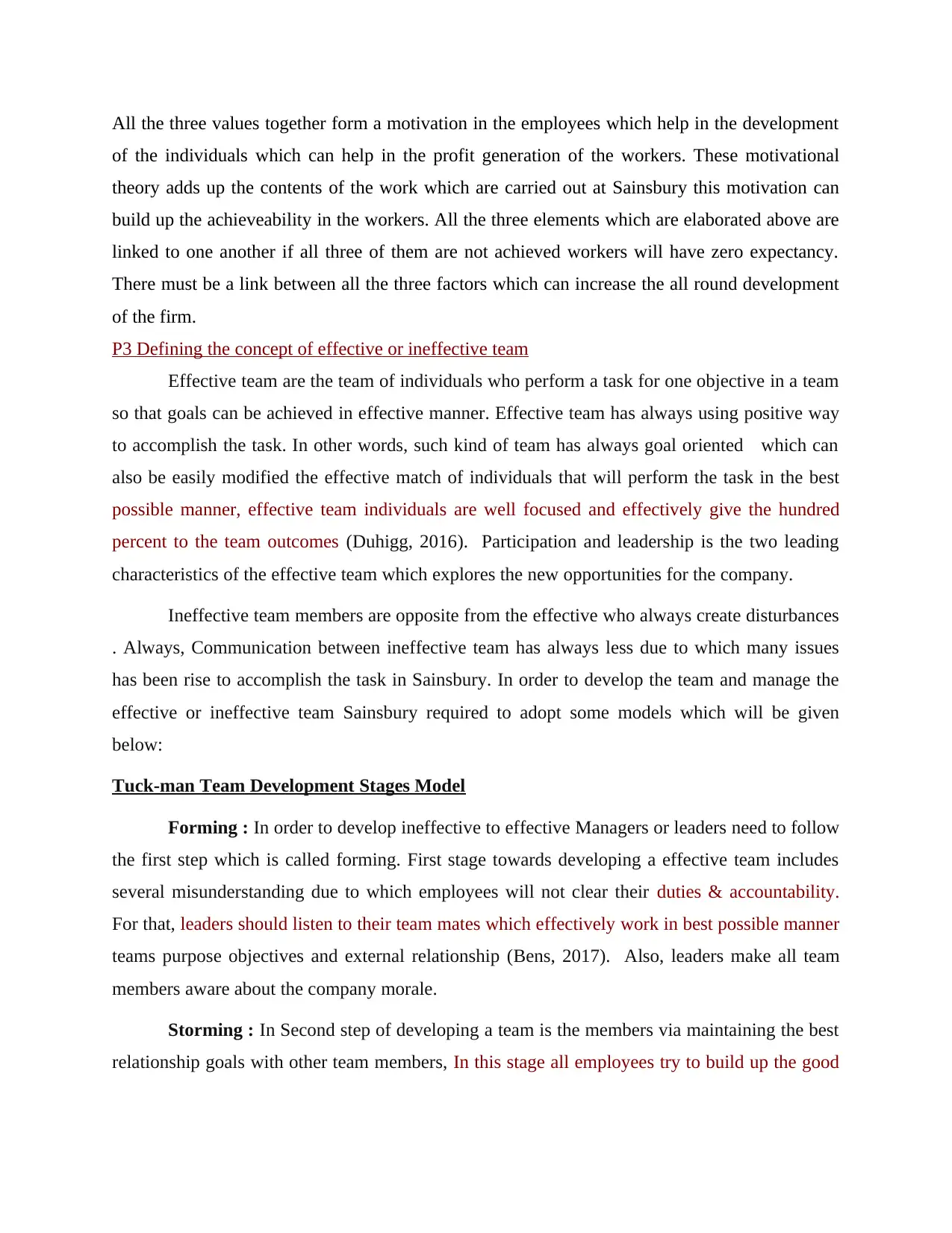
All the three values together form a motivation in the employees which help in the development
of the individuals which can help in the profit generation of the workers. These motivational
theory adds up the contents of the work which are carried out at Sainsbury this motivation can
build up the achieveability in the workers. All the three elements which are elaborated above are
linked to one another if all three of them are not achieved workers will have zero expectancy.
There must be a link between all the three factors which can increase the all round development
of the firm.
P3 Defining the concept of effective or ineffective team
Effective team are the team of individuals who perform a task for one objective in a team
so that goals can be achieved in effective manner. Effective team has always using positive way
to accomplish the task. In other words, such kind of team has always goal oriented which can
also be easily modified the effective match of individuals that will perform the task in the best
possible manner, effective team individuals are well focused and effectively give the hundred
percent to the team outcomes (Duhigg, 2016). Participation and leadership is the two leading
characteristics of the effective team which explores the new opportunities for the company.
Ineffective team members are opposite from the effective who always create disturbances
. Always, Communication between ineffective team has always less due to which many issues
has been rise to accomplish the task in Sainsbury. In order to develop the team and manage the
effective or ineffective team Sainsbury required to adopt some models which will be given
below:
Tuck-man Team Development Stages Model
Forming : In order to develop ineffective to effective Managers or leaders need to follow
the first step which is called forming. First stage towards developing a effective team includes
several misunderstanding due to which employees will not clear their duties & accountability.
For that, leaders should listen to their team mates which effectively work in best possible manner
teams purpose objectives and external relationship (Bens, 2017). Also, leaders make all team
members aware about the company morale.
Storming : In Second step of developing a team is the members via maintaining the best
relationship goals with other team members, In this stage all employees try to build up the good
of the individuals which can help in the profit generation of the workers. These motivational
theory adds up the contents of the work which are carried out at Sainsbury this motivation can
build up the achieveability in the workers. All the three elements which are elaborated above are
linked to one another if all three of them are not achieved workers will have zero expectancy.
There must be a link between all the three factors which can increase the all round development
of the firm.
P3 Defining the concept of effective or ineffective team
Effective team are the team of individuals who perform a task for one objective in a team
so that goals can be achieved in effective manner. Effective team has always using positive way
to accomplish the task. In other words, such kind of team has always goal oriented which can
also be easily modified the effective match of individuals that will perform the task in the best
possible manner, effective team individuals are well focused and effectively give the hundred
percent to the team outcomes (Duhigg, 2016). Participation and leadership is the two leading
characteristics of the effective team which explores the new opportunities for the company.
Ineffective team members are opposite from the effective who always create disturbances
. Always, Communication between ineffective team has always less due to which many issues
has been rise to accomplish the task in Sainsbury. In order to develop the team and manage the
effective or ineffective team Sainsbury required to adopt some models which will be given
below:
Tuck-man Team Development Stages Model
Forming : In order to develop ineffective to effective Managers or leaders need to follow
the first step which is called forming. First stage towards developing a effective team includes
several misunderstanding due to which employees will not clear their duties & accountability.
For that, leaders should listen to their team mates which effectively work in best possible manner
teams purpose objectives and external relationship (Bens, 2017). Also, leaders make all team
members aware about the company morale.
Storming : In Second step of developing a team is the members via maintaining the best
relationship goals with other team members, In this stage all employees try to build up the good
⊘ This is a preview!⊘
Do you want full access?
Subscribe today to unlock all pages.

Trusted by 1+ million students worldwide
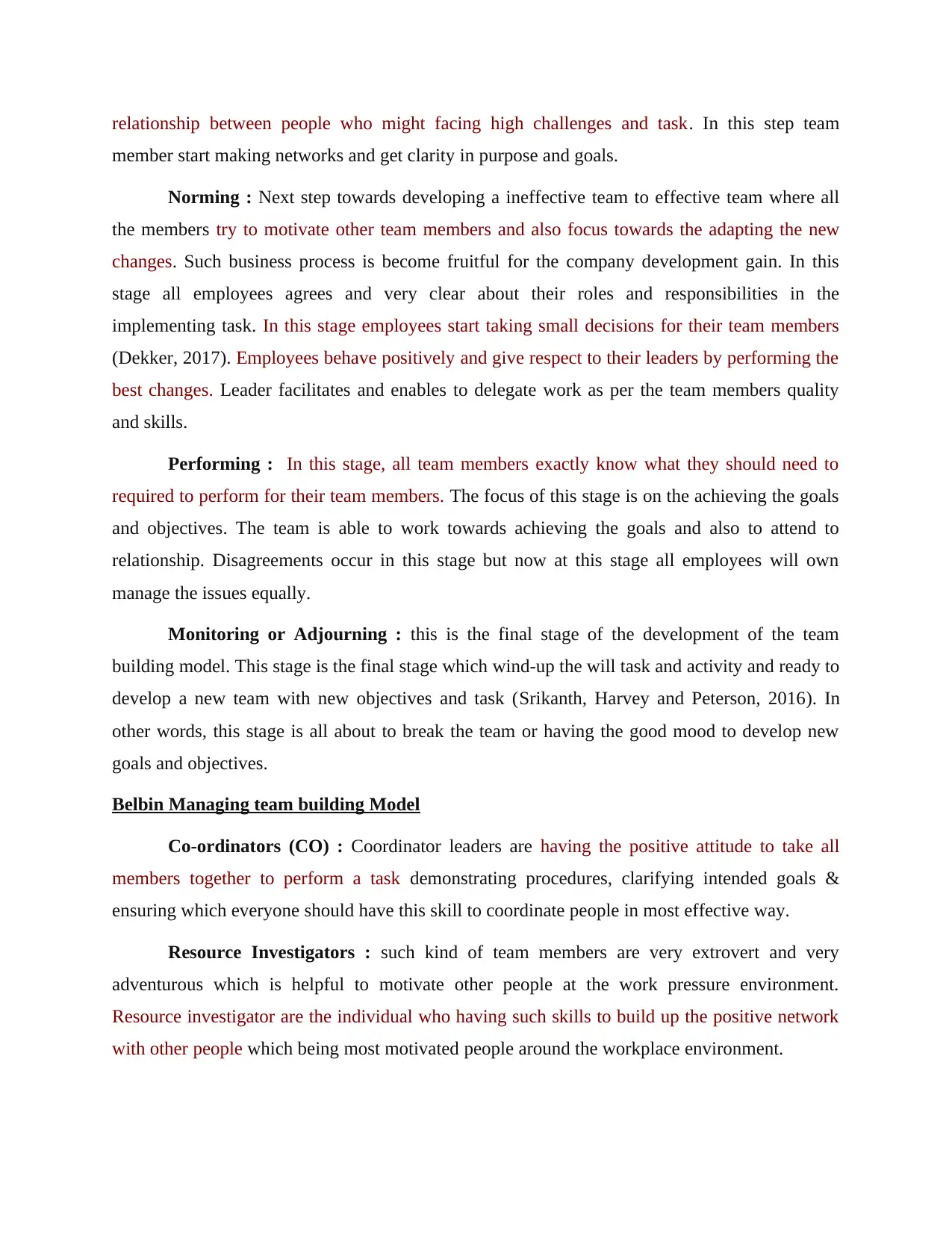
relationship between people who might facing high challenges and task. In this step team
member start making networks and get clarity in purpose and goals.
Norming : Next step towards developing a ineffective team to effective team where all
the members try to motivate other team members and also focus towards the adapting the new
changes. Such business process is become fruitful for the company development gain. In this
stage all employees agrees and very clear about their roles and responsibilities in the
implementing task. In this stage employees start taking small decisions for their team members
(Dekker, 2017). Employees behave positively and give respect to their leaders by performing the
best changes. Leader facilitates and enables to delegate work as per the team members quality
and skills.
Performing : In this stage, all team members exactly know what they should need to
required to perform for their team members. The focus of this stage is on the achieving the goals
and objectives. The team is able to work towards achieving the goals and also to attend to
relationship. Disagreements occur in this stage but now at this stage all employees will own
manage the issues equally.
Monitoring or Adjourning : this is the final stage of the development of the team
building model. This stage is the final stage which wind-up the will task and activity and ready to
develop a new team with new objectives and task (Srikanth, Harvey and Peterson, 2016). In
other words, this stage is all about to break the team or having the good mood to develop new
goals and objectives.
Belbin Managing team building Model
Co-ordinators (CO) : Coordinator leaders are having the positive attitude to take all
members together to perform a task demonstrating procedures, clarifying intended goals &
ensuring which everyone should have this skill to coordinate people in most effective way.
Resource Investigators : such kind of team members are very extrovert and very
adventurous which is helpful to motivate other people at the work pressure environment.
Resource investigator are the individual who having such skills to build up the positive network
with other people which being most motivated people around the workplace environment.
member start making networks and get clarity in purpose and goals.
Norming : Next step towards developing a ineffective team to effective team where all
the members try to motivate other team members and also focus towards the adapting the new
changes. Such business process is become fruitful for the company development gain. In this
stage all employees agrees and very clear about their roles and responsibilities in the
implementing task. In this stage employees start taking small decisions for their team members
(Dekker, 2017). Employees behave positively and give respect to their leaders by performing the
best changes. Leader facilitates and enables to delegate work as per the team members quality
and skills.
Performing : In this stage, all team members exactly know what they should need to
required to perform for their team members. The focus of this stage is on the achieving the goals
and objectives. The team is able to work towards achieving the goals and also to attend to
relationship. Disagreements occur in this stage but now at this stage all employees will own
manage the issues equally.
Monitoring or Adjourning : this is the final stage of the development of the team
building model. This stage is the final stage which wind-up the will task and activity and ready to
develop a new team with new objectives and task (Srikanth, Harvey and Peterson, 2016). In
other words, this stage is all about to break the team or having the good mood to develop new
goals and objectives.
Belbin Managing team building Model
Co-ordinators (CO) : Coordinator leaders are having the positive attitude to take all
members together to perform a task demonstrating procedures, clarifying intended goals &
ensuring which everyone should have this skill to coordinate people in most effective way.
Resource Investigators : such kind of team members are very extrovert and very
adventurous which is helpful to motivate other people at the work pressure environment.
Resource investigator are the individual who having such skills to build up the positive network
with other people which being most motivated people around the workplace environment.
Paraphrase This Document
Need a fresh take? Get an instant paraphrase of this document with our AI Paraphraser
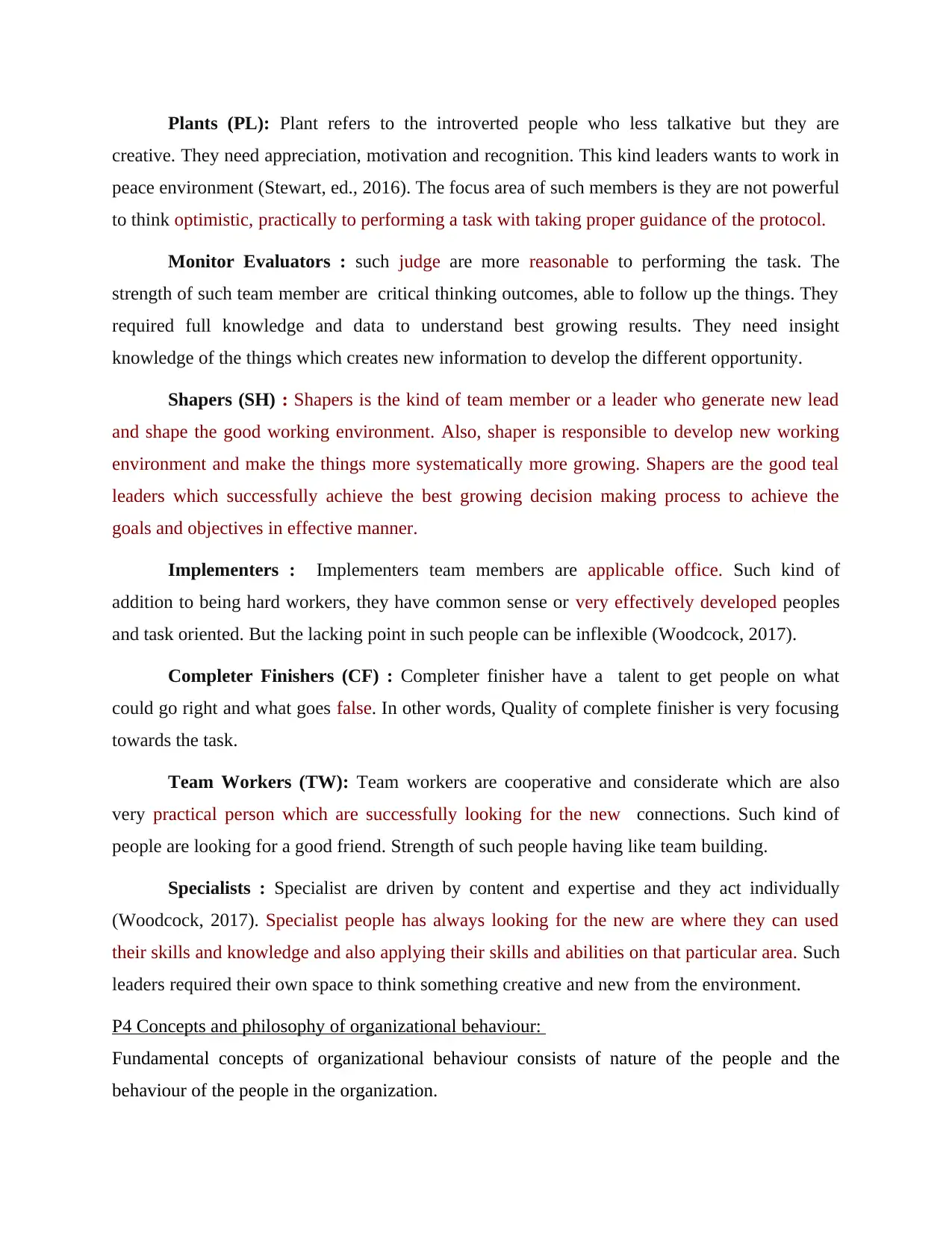
Plants (PL): Plant refers to the introverted people who less talkative but they are
creative. They need appreciation, motivation and recognition. This kind leaders wants to work in
peace environment (Stewart, ed., 2016). The focus area of such members is they are not powerful
to think optimistic, practically to performing a task with taking proper guidance of the protocol.
Monitor Evaluators : such judge are more reasonable to performing the task. The
strength of such team member are critical thinking outcomes, able to follow up the things. They
required full knowledge and data to understand best growing results. They need insight
knowledge of the things which creates new information to develop the different opportunity.
Shapers (SH) : Shapers is the kind of team member or a leader who generate new lead
and shape the good working environment. Also, shaper is responsible to develop new working
environment and make the things more systematically more growing. Shapers are the good teal
leaders which successfully achieve the best growing decision making process to achieve the
goals and objectives in effective manner.
Implementers : Implementers team members are applicable office. Such kind of
addition to being hard workers, they have common sense or very effectively developed peoples
and task oriented. But the lacking point in such people can be inflexible (Woodcock, 2017).
Completer Finishers (CF) : Completer finisher have a talent to get people on what
could go right and what goes false. In other words, Quality of complete finisher is very focusing
towards the task.
Team Workers (TW): Team workers are cooperative and considerate which are also
very practical person which are successfully looking for the new connections. Such kind of
people are looking for a good friend. Strength of such people having like team building.
Specialists : Specialist are driven by content and expertise and they act individually
(Woodcock, 2017). Specialist people has always looking for the new are where they can used
their skills and knowledge and also applying their skills and abilities on that particular area. Such
leaders required their own space to think something creative and new from the environment.
P4 Concepts and philosophy of organizational behaviour:
Fundamental concepts of organizational behaviour consists of nature of the people and the
behaviour of the people in the organization.
creative. They need appreciation, motivation and recognition. This kind leaders wants to work in
peace environment (Stewart, ed., 2016). The focus area of such members is they are not powerful
to think optimistic, practically to performing a task with taking proper guidance of the protocol.
Monitor Evaluators : such judge are more reasonable to performing the task. The
strength of such team member are critical thinking outcomes, able to follow up the things. They
required full knowledge and data to understand best growing results. They need insight
knowledge of the things which creates new information to develop the different opportunity.
Shapers (SH) : Shapers is the kind of team member or a leader who generate new lead
and shape the good working environment. Also, shaper is responsible to develop new working
environment and make the things more systematically more growing. Shapers are the good teal
leaders which successfully achieve the best growing decision making process to achieve the
goals and objectives in effective manner.
Implementers : Implementers team members are applicable office. Such kind of
addition to being hard workers, they have common sense or very effectively developed peoples
and task oriented. But the lacking point in such people can be inflexible (Woodcock, 2017).
Completer Finishers (CF) : Completer finisher have a talent to get people on what
could go right and what goes false. In other words, Quality of complete finisher is very focusing
towards the task.
Team Workers (TW): Team workers are cooperative and considerate which are also
very practical person which are successfully looking for the new connections. Such kind of
people are looking for a good friend. Strength of such people having like team building.
Specialists : Specialist are driven by content and expertise and they act individually
(Woodcock, 2017). Specialist people has always looking for the new are where they can used
their skills and knowledge and also applying their skills and abilities on that particular area. Such
leaders required their own space to think something creative and new from the environment.
P4 Concepts and philosophy of organizational behaviour:
Fundamental concepts of organizational behaviour consists of nature of the people and the
behaviour of the people in the organization.
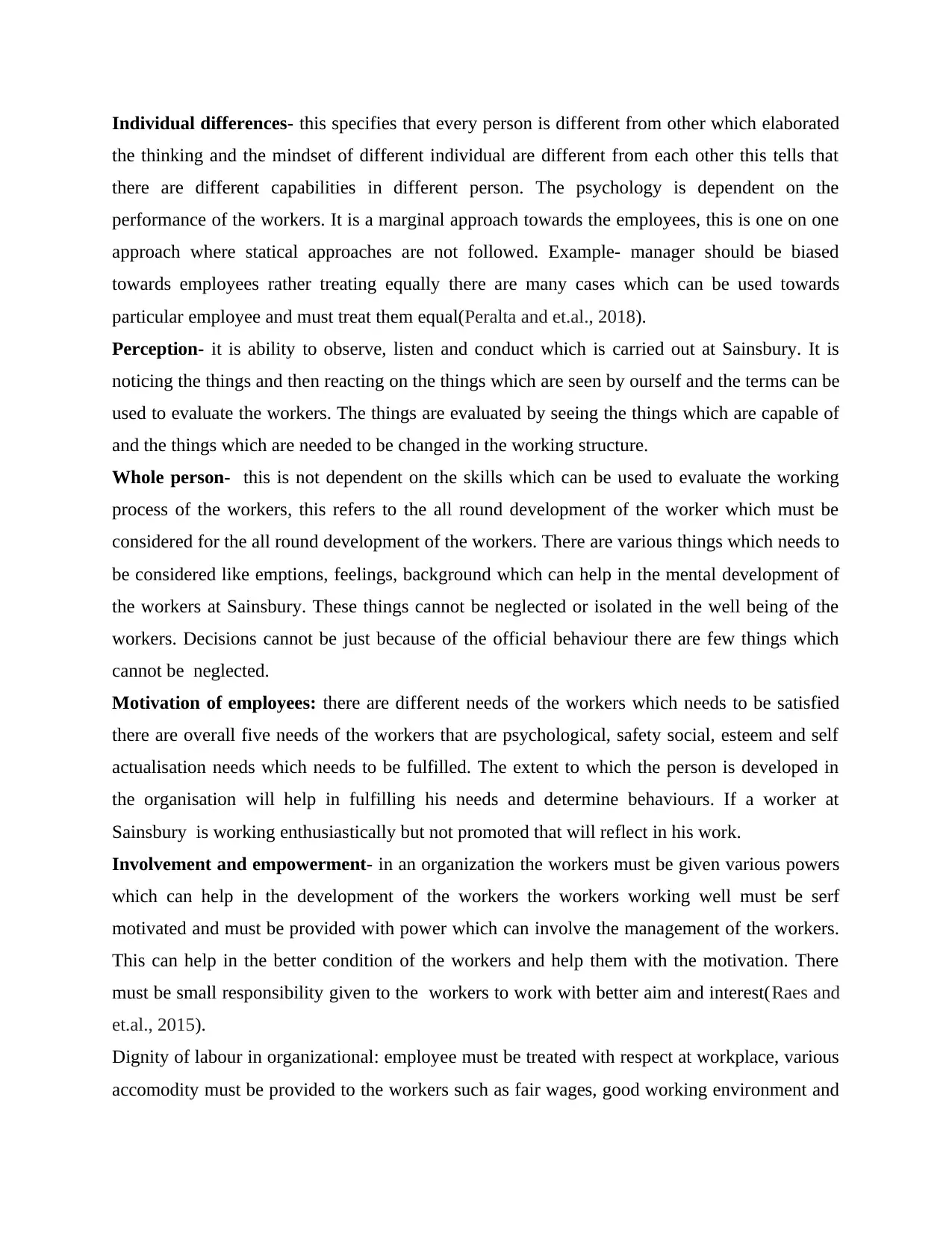
Individual differences- this specifies that every person is different from other which elaborated
the thinking and the mindset of different individual are different from each other this tells that
there are different capabilities in different person. The psychology is dependent on the
performance of the workers. It is a marginal approach towards the employees, this is one on one
approach where statical approaches are not followed. Example- manager should be biased
towards employees rather treating equally there are many cases which can be used towards
particular employee and must treat them equal(Peralta and et.al., 2018).
Perception- it is ability to observe, listen and conduct which is carried out at Sainsbury. It is
noticing the things and then reacting on the things which are seen by ourself and the terms can be
used to evaluate the workers. The things are evaluated by seeing the things which are capable of
and the things which are needed to be changed in the working structure.
Whole person- this is not dependent on the skills which can be used to evaluate the working
process of the workers, this refers to the all round development of the worker which must be
considered for the all round development of the workers. There are various things which needs to
be considered like emptions, feelings, background which can help in the mental development of
the workers at Sainsbury. These things cannot be neglected or isolated in the well being of the
workers. Decisions cannot be just because of the official behaviour there are few things which
cannot be neglected.
Motivation of employees: there are different needs of the workers which needs to be satisfied
there are overall five needs of the workers that are psychological, safety social, esteem and self
actualisation needs which needs to be fulfilled. The extent to which the person is developed in
the organisation will help in fulfilling his needs and determine behaviours. If a worker at
Sainsbury is working enthusiastically but not promoted that will reflect in his work.
Involvement and empowerment- in an organization the workers must be given various powers
which can help in the development of the workers the workers working well must be serf
motivated and must be provided with power which can involve the management of the workers.
This can help in the better condition of the workers and help them with the motivation. There
must be small responsibility given to the workers to work with better aim and interest(Raes and
et.al., 2015).
Dignity of labour in organizational: employee must be treated with respect at workplace, various
accomodity must be provided to the workers such as fair wages, good working environment and
the thinking and the mindset of different individual are different from each other this tells that
there are different capabilities in different person. The psychology is dependent on the
performance of the workers. It is a marginal approach towards the employees, this is one on one
approach where statical approaches are not followed. Example- manager should be biased
towards employees rather treating equally there are many cases which can be used towards
particular employee and must treat them equal(Peralta and et.al., 2018).
Perception- it is ability to observe, listen and conduct which is carried out at Sainsbury. It is
noticing the things and then reacting on the things which are seen by ourself and the terms can be
used to evaluate the workers. The things are evaluated by seeing the things which are capable of
and the things which are needed to be changed in the working structure.
Whole person- this is not dependent on the skills which can be used to evaluate the working
process of the workers, this refers to the all round development of the worker which must be
considered for the all round development of the workers. There are various things which needs to
be considered like emptions, feelings, background which can help in the mental development of
the workers at Sainsbury. These things cannot be neglected or isolated in the well being of the
workers. Decisions cannot be just because of the official behaviour there are few things which
cannot be neglected.
Motivation of employees: there are different needs of the workers which needs to be satisfied
there are overall five needs of the workers that are psychological, safety social, esteem and self
actualisation needs which needs to be fulfilled. The extent to which the person is developed in
the organisation will help in fulfilling his needs and determine behaviours. If a worker at
Sainsbury is working enthusiastically but not promoted that will reflect in his work.
Involvement and empowerment- in an organization the workers must be given various powers
which can help in the development of the workers the workers working well must be serf
motivated and must be provided with power which can involve the management of the workers.
This can help in the better condition of the workers and help them with the motivation. There
must be small responsibility given to the workers to work with better aim and interest(Raes and
et.al., 2015).
Dignity of labour in organizational: employee must be treated with respect at workplace, various
accomodity must be provided to the workers such as fair wages, good working environment and
⊘ This is a preview!⊘
Do you want full access?
Subscribe today to unlock all pages.

Trusted by 1+ million students worldwide
1 out of 16
Related Documents
Your All-in-One AI-Powered Toolkit for Academic Success.
+13062052269
info@desklib.com
Available 24*7 on WhatsApp / Email
![[object Object]](/_next/static/media/star-bottom.7253800d.svg)
Unlock your academic potential
Copyright © 2020–2026 A2Z Services. All Rights Reserved. Developed and managed by ZUCOL.




